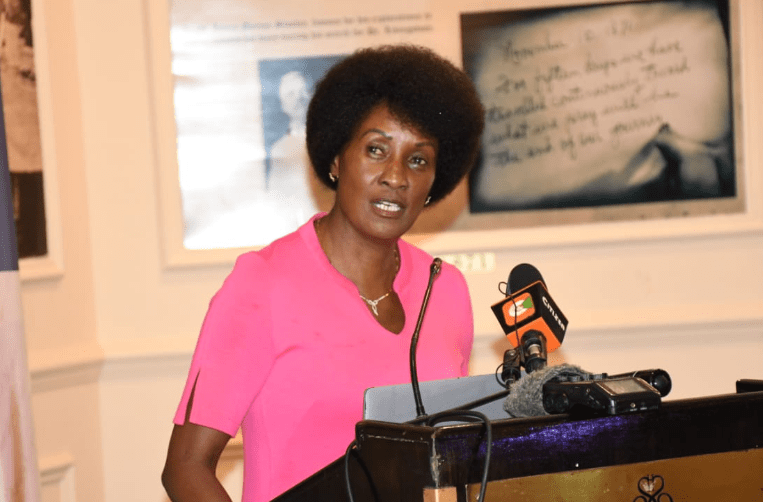Mvurya calls on foreign investors to apply for coltan mining licence

Cabinet Secretary for Mining, Blue Economy and Maritime Affairs Salim Mvurya recently announced the discovery of coltan deposits in the country in the wake of radical reforms implementation in the sector after lifting of the mining moratorium.
He spoke to People Daily’s Barack Oduor on why mining has the potential of turning around Kenya’s fortunes.
Q: During a field visit to Embu County, you recently announced the discovery of coltan deposits. What does this discovery mean and when should Kenyans expect it to be fully prospected for and mined?
Coltan is a technology and green mineral that is currently experiencing a surging demand due to its use as an input in the advancement of energy transition aspirations globally. The mineral is a major input in all electronic gadgets and also in energy storage batteries for car and domestic uses and is therefore experiencing supply constraints globally.
The declaration of availability of the mineral in Kenya is therefore very significant given that 70 -80 per cent of all current source of coltan is in the Democratic Republic of Congo.
The announcement is as a marketing move and an awareness campaign aimed at pointing to both local and international investors of the opportunity to apply for exploration licenses to look for this critical mineral that is abound in areas such as Embu, parts of Mwingi North, Kora Wells, Northern Tana River, Ikutha, West Pokot, Turkana and Samburu.
Regarding exploration and mining timelines, plans are in top gear to ensure that the state collects adequate geological data to warrant licensing of these resources from an informed point of view.
Q: What is the state of mining in the country since Government lifted the ban last year?
On October 3, 2023, the Cabinet lifted the licensing ban that had been effected in 2019 to pave the way for several key government interventions in the mining sector including the conclusion of a nationwide Airborne Geophysical Survey. Since this lifting, the ministry has made significant progress in advancing the objectives and principles enshrined in the Mining Act, 2016 in as far as licensing is concerned. The online mineral rights administration system is active. So far we have received a total of 1,206 applications for various mineral rights and the process of evaluating these applications is ongoing. As of now, we have also received 260 applications out of which 146 have been processed and issued to traders in the industry.
Q: Investors had raised the issue of bureaucratic processes in dealing with the Treasury and also in obtaining mining and prospecting licenses. Has this now changed?
The Mining cadastre system was developed to ensure a seamless application process of all mineral rights. The online system was also meant to reduce cases of license overlaps and thus reduce conflicts. It also has in-built timelines that are tied to the Mining Act.
Q: Before the moratorium there was the issue of the Government dragging its feet in issuing new mining permits and licenses. Has the situation now changed?
The process of issuing licenses and permits is now automated and available online. The Online Mining Cadastre Portal is manned throughout to ensure that applicants are advised when their application is received and throughout the evaluation process.
Q: The State has for the first time recognised artisanal mining as legal and called on regional mining officers to assist in organising artisanal miners into cooperatives. What is the significance of this move?
Artisanal mining provided livelihoods to over 800,000 households in Kenya. The activity is a mainstream economic activity in many communities around Western, Nyanza and other areas. To ensure that artisanal miners get the attention and support of State§ services, they need to be formalised and categorised into marketing cooperatives. These cooperatives will reduce the over-exploitation of individual miners by middlemen. So far, the ministry, in collaboration with respective county governments have formalised over 200 artisanal miner cooperatives across the country.
Q: Base Titanium will shut down its operations in Kwale County. How will this move affect the mining sector and what is the government planning to do to mitigate the adverse effects this will cause?
Base Titanium has notified the government of the exhaustion of mineable resources at their current mine site and this is consistent with the mining business. The State is working closely with the company on its mining closure plans including the post mine land use. Whereas the company is among the largest investors in the mining sector, its exit will be supplemented by other incoming mining investments. The company is also undertaking exploration in other areas and upon confirmation of exploration results, they will determine the next course of action.
Q: How has the mining sector been affected by illicit and cross-border smuggling of minerals into and out of the country?
Illegal mining and cross-border illicit trade in minerals and other goods have already been categorised as an economic crime. This follows the realisation that the vice has permeated the sector arising out of years of almost neglect and poor compliance and enforcement checks.
To curb the spread of this vice, the Government has formed a special police unit that is charged with the responsibility of complementing the Ministry’s efforts at both detecting and deterring illicit and illegal mineral trade.
Q: The Government of Kenya has stepped up its efforts to access the European Union market for Kenyan fish following a new partnership to exploit the blue economy in the country. The Government and EU has organised a major continental blue economy investment conference that will bring together EU and Africa’s investors. What is the significance of this conference?
The second Blue Invest Africa event will be held on July 23-4, 2024 in Leisure Lodge Mombasa, Kenya. The purpose of the forum is to discuss the way forward in the Blue Invest Africa is a match-making event between African entrepreneurs and investors, aimed at improving access to finance and investment in the Blue Economy sector.
Q: You recently led the Government in signing a Sh4.8 billion deal with an investor to spearhead the revival of fluorspar mining at Kimwarer in Elgeyo Marakwet County. What is the significance of this deal?
Earlier this week, I witnessed the signing of an investment agreement between a mining investor and the Kenyan Government for the revival of Fluorspar Mining in Kimwarer, Elgeyo Marakwet County. This culminated from a process of procurement of a suitable investor that the government initiated in 2023. The investment will have numerous benefits to the residents of Kimwarer through employment creation and local economy revitalisation, the county government of Elgeyo Marakwet and the nation at large.












